Fractional CMO: Flexible Solutions for Strategic Marketing



The Fractional Chief Marketing Officer (CMO) role has emerged as a pivotal solution in the evolving landscape of marketing leadership, with CMOs increasingly focused on driving growth strategies for organizations. However, the average CMO tenure has dropped to just 3.3 years, creating challenges for businesses seeking consistent strategic leadership in marketing.
This trend highlights the growing importance of fractional CMOs, who provide businesses with flexible and cost-effective access to top-tier marketing expertise without the need for a full-time hire.
Fractional CMOs are highly experienced marketing executives who work with companies on a part-time or project basis. This flexible model allows businesses to tap into top-tier marketing expertise without the long-term commitment or cost of a full-time executive.
The increasing adoption of fractional CMOs reflects a broader shift in corporate strategy, where agility and specialized knowledge are essential, particularly in the face of budget constraints and rapid technological advancements.
This article delves into the role of Fractional CMO, addressing the following questions:
- What specific challenges do companies face that make fractional CMOs a viable solution?
- How does the role of a fractional CMO differ from that of a traditional, full-time CMO?
- What are the tangible benefits that companies can expect from engaging a fractional CMO, particularly in terms of cost efficiency, flexibility, and return on investment?
The evolving responsibilities of CMOs towards global strategy roles
Today’s Chief Marketing Officers (CMOs) are increasingly involved in responsibilities that extend far beyond traditional marketing functions. According to research by Deloitte and the CMO Council, 27% of surveyed executives now see the CMO as primarily responsible for devising growth strategies and generating revenue.
Furthermore, 68% of CMOs acknowledge that being a growth driver is one of the top expectations from senior management and the board. Despite this, there is still a misalignment between their aspirations and their actual impact.
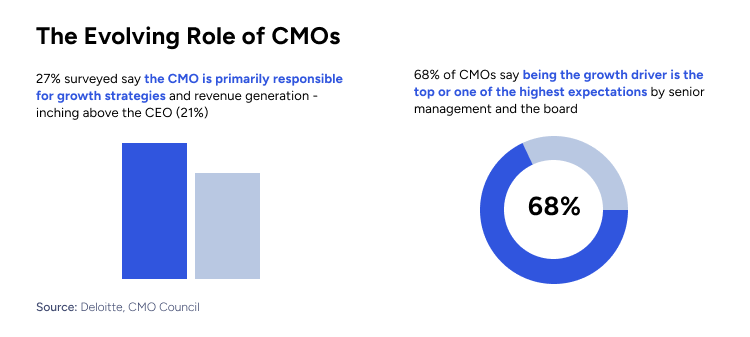
For instance, 66% of CMOs desire to spend their time teaming with leadership on global business strategy, but only 16% report doing so. Similarly, while 58% wish to focus on innovating and implementing new approaches, only 41% manage to dedicate their time to these activities.
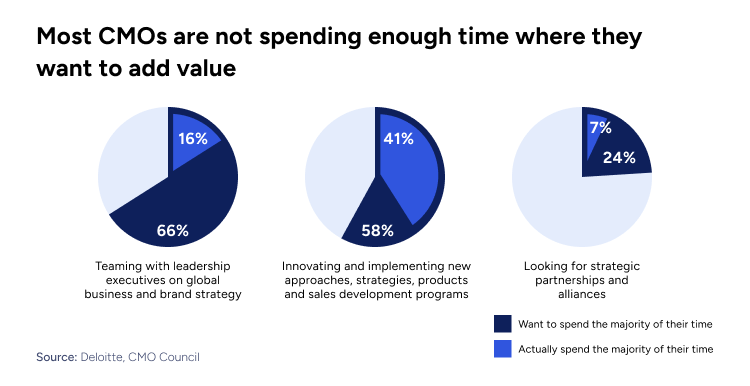
There is a clear gap between where CMOs want to focus their efforts—on strategic, growth-driving activities—and where they currently spend their time, which is often consumed by operational tasks such as reviewing plans and budgets (45%) and attending internal meetings (42%).
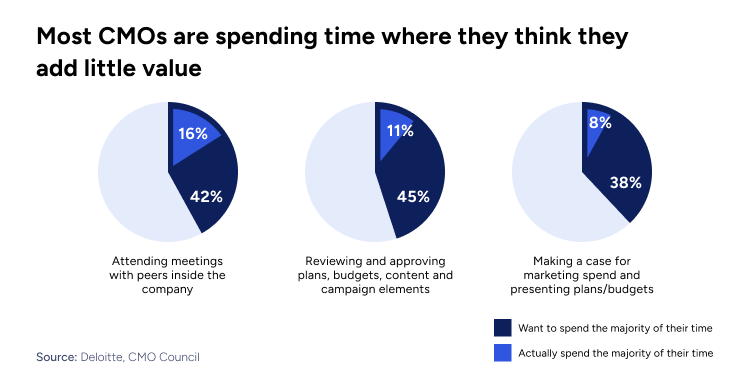
CMO Turnover Crisis: The Urgent Need for CEO-CMO Alignment
Despite the importance of CMOs, their tenure in the C-suite role has been shrinking. According to a 2024 report, the average tenure of a CMO has fallen to just 3.3 years, down from 4.5 years in 2021 and 44 months in 2017.
This makes the CMO role one of the shortest tenures in the C-suite, compared to the average tenure of CEOs at 7.4 years and CFOs at 5.3 years. This data is still declining, making CMO tenure at its lowest point in a decade.
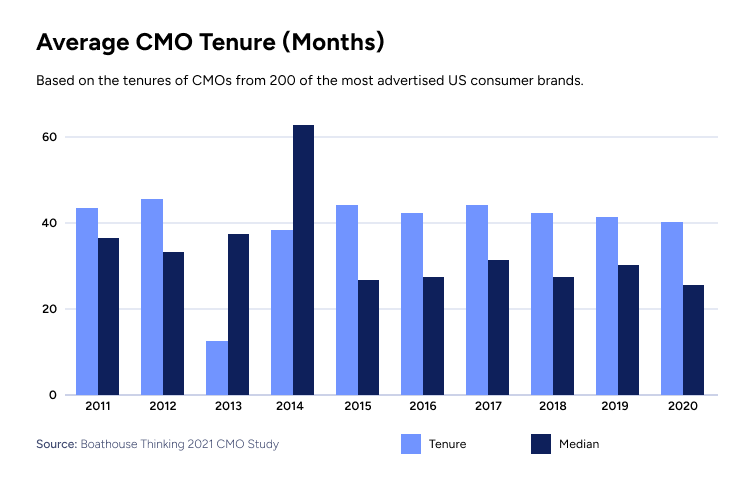
Low CMO tenure might be a consequence of the reporting role they have with the CEO. When there is a mismatch in vision or expectations, the CMO is often replaced. Only 34% of CEOs had "great confidence" in their CMOs, with 66% reporting having little confidence in current marketing executives.
Thus, many CMOs struggle to build strong relationships with their CEOs: only 56% of CEOs believe CMO supports their long-term vision. This lack of alignment can lead to disagreements and ultimately, the early departure of the CMO.
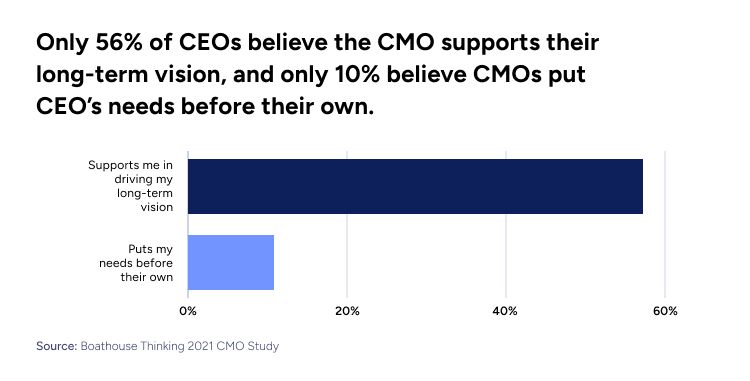
This issue is becoming a major obstacle for Marketing Departments. The CMO plays a crucial role in shaping a company’s public but also internal identity, so a change in this leadership position can significantly disrupt the brand’s messaging and strategy.
Frequent turnover can lead to confusion within the marketing team and disconnect with target audiences, as they constantly have to adapt to new directions.
Fractional CMO Leadership to Bridge the Gap
This relatively short tenure raises concerns about the continuity and long-term strategic planning of marketing initiatives. To avoid this instability, more companies are turning to fractional CMOs, also known as interim CMOs.
These part-time or freelance executives offer consistent leadership without the need for a full-time hire. In this model, the strategy is guided by the board and C-suites, while the fractional CMO ensures continuity and momentum in marketing efforts.
In fact, while it is true that Interim CMOs are inherently short-term solutions and will not solve the problem of CMO tenure, companies can leverage interim CMOs to fill immediate leadership gaps while developing internal talent for long-term succession.
This solution might be especially relevant during periods of transitions and change, following an unexpected departure of the CMO:
- 25% of interim managers are hired specifically for change management, as they bring a fresh and unbiased perspective on place;
- A quarter of fractional CMOs are eventually promoted to full-time CMO positions, underscoring their effectiveness and the high level of trust companies place in their Fractional capabilities;
- Fractional CMOs ensure continuity of leadership to maintain smooth operations during periods of change while benefiting from the agility and cost efficiency related to the role.
Organizations should integrate interim CMOs into the broader strategic framework. This includes setting clear objectives for their tenure, ensuring alignment with long-term goals, and facilitating a smooth handover process to the permanent CMO. Let’s explore more in detail their role and the benefits for companies.
Understanding Fractional Leadership
The Growing Popularity of Fractional Leadership
Over the past year, numerous large and mid-sized companies have experienced significant layoffs, especially in managerial positions.
Interestingly, despite these challenges, interim management and fractional jobs have seen a substantial increase. According to an analysis by MDL Partners, using data from the Bureau of Labor Statistics, the number of fractional managers grew by 18% from 2021 to 2022 and has surged by 57% since 2020.
Currently, 25% of US businesses have adopted fractional hiring, with this percentage expected to increase to 35% by 2025. Of all the fractional projects, 56% involve C-suite positions, with 31% being in finance and 19% in Marketing function.
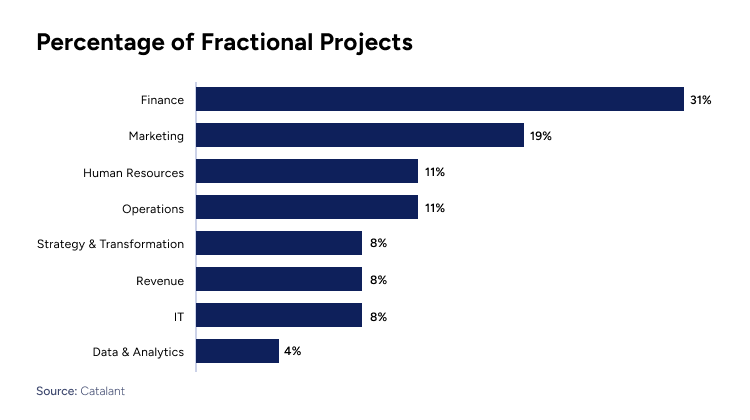
Fractional CMOs: Their Role and Advantages
Fractional CMOs are emerging as a strategic solution to the above-mentioned problems. The pressures are further complicated by tightening budgets, with reports indicating a 30% reduction in marketing spending compared to 2019.
Fractional CMOs are involved at the level of strategic marketing. This involves setting long-term goals and objectives, defining the brand’s positioning in the market, identifying target audiences, and creating a comprehensive plan to achieve these goals.
The benefits of hiring marketing fractional leaders or interim managers include:
- Cost Efficiency: The average cost of hiring a full-time CMO can range from $200,000 to $350,000 annually, plus benefits. In contrast, a Fractional CMO can cost between $3,000 and $15,000 per month, depending on the scope and time commitment, resulting in significant savings.
- Flexibility: The flexibility of a Fractional CMO enables businesses to scale their marketing leadership as needed. For example, companies can engage a Fractional CMO for a specific project or during peak business periods, costing significantly less than maintaining a full-time executive.
- Objectivity and Unbiased Perspective: Fractional CMOs provide an external, objective viewpoint, helping businesses avoid internal biases. This objectivity is critical for making strategic decisions that align with market realities, which is often undervalued but crucial for achieving marketing success.
- Higher ROI: According to Forbes, companies can see a return on investment of up to 600% when strategic marketing is properly executed by an experienced Fractional CMO, compared to inexperienced CMOs or costly full-time hires.
- Specialized Expertise to answer to skills gaps: 80% of CEOs believe CMO turnover is happening because CMOs are failing and are not bringing the right expertise in place. By hiring fractional CMOs, organizations can hire leaders to respond to talent gaps.
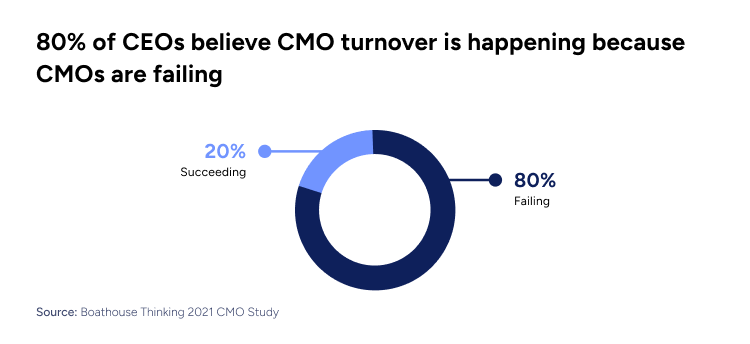
Case Study: Fractional CMO for Gen AI Implementation in the Consumer Goods Industry
The Challenge
A leading consumer goods company identified generative AI (GenAI) as a critical tool to enhance its marketing strategies, personalize customer experiences, and streamline content creation. However, the internal marketing team lacked the specific expertise needed to implement GenAI effectively.
The challenge was to integrate GenAI into their existing marketing operations, ensuring a seamless transition and maximizing ROI without disrupting ongoing campaigns. The company needed a strategic leader who could oversee the GenAI integration, align it with business objectives, and provide immediate impact.
Role of Consultport
The company engaged Consultport, which proposed three profiles within 48 hours. The company chose a Fractional CMO with a robust background in AI-driven marketing strategies and the consumer goods industry. The selected consultant had over 15 years of experience in leading digital transformations and had successfully integrated GenAI tools into marketing functions at Fortune 500 companies.
This Fractional CMO needed to develop a comprehensive GenAI implementation strategy tailored to the company's needs, guiding the internal team through the integration process, and ensuring that all AI applications aligned with the company’s strategic goals. The role also included upskilling the internal team to handle AI-driven marketing tasks post-implementation.
The Approach of the Fractional CMO
The consultant started by conducting an audit of the company’s existing marketing processes, tools, and data infrastructure. The goal was to identify areas where GenAI could deliver the most value. The approach included:
- Initial Assessment and Strategy Development:
- Conducted a detailed review of the company’s customer data, content creation workflows, and marketing automation tools.
- Collaborated with key stakeholders to define clear objectives for the GenAI integration, focusing on customer personalization, content efficiency, and market segmentation.
- Developed a phased implementation plan that minimized disruption to ongoing campaigns.
- Technology Integration:
- Implemented GenAI tools such as OpenAI's GPT models for content creation, Salesforce's Einstein for customer personalization, and Segment for advanced market segmentation.
- Integrated these tools with the company’s existing CRM and marketing automation platforms to ensure seamless data flow and campaign management.
- Customized AI algorithms to align with the company’s brand voice and customer engagement strategies.
- Team Training and Upskilling:
- Conducted workshops and training sessions for the internal marketing team to ensure they could effectively use the new AI tools.
- Established ongoing support mechanisms, including regular check-ins and performance reviews, to address any challenges that arose during the transition.
- Performance Monitoring and Optimization:
- Developed custom KPIs to track the performance of Gen AI-driven initiatives, including content creation speed, customer engagement levels, and conversion rates.
- Used advanced analytics tools to monitor campaign performance in real-time, making data-driven adjustments to optimize results.
Results
The integration of GenAI under the guidance of the Fractional CMO led to significant improvements across multiple key performance indicators (KPIs). Within six months, the company achieved:
- 30% Reduction in Content Creation Time: The implementation of GenAI tools accelerated the content creation process, enabling the marketing team to produce high-quality content in a fraction of the time previously required.
- 25% Increase in Customer Engagement: Personalized recommendations powered by GenAI led to a noticeable increase in customer interaction, as measured by click-through rates and time spent on the company’s digital platforms.
- 5% Improvement in Conversion Rates: Enhanced market segmentation and targeted campaigns resulted in a higher conversion rate, contributing directly to the company’s bottom line.
This case illustrates how a Fractional CMO, with the right expertise, can drive significant business value by effectively integrating advanced technologies like GenAI into existing marketing operations, all while maintaining cost efficiency and flexibility.
Want to know more? Find a consultant.

Alice is a fractional CMO who has worked with renowned German startups and scale-ups, including Zalando. She specializes in developing marketing strategies that improve brand visibility, customer acquisition, and revenue growth. In her roles as an interim CMO, Alice has implemented data-driven marketing plans, optimized digital marketing channels, and streamlined campaign execution processes. She also has extensive team-leading experience.
on a weekly basis.


